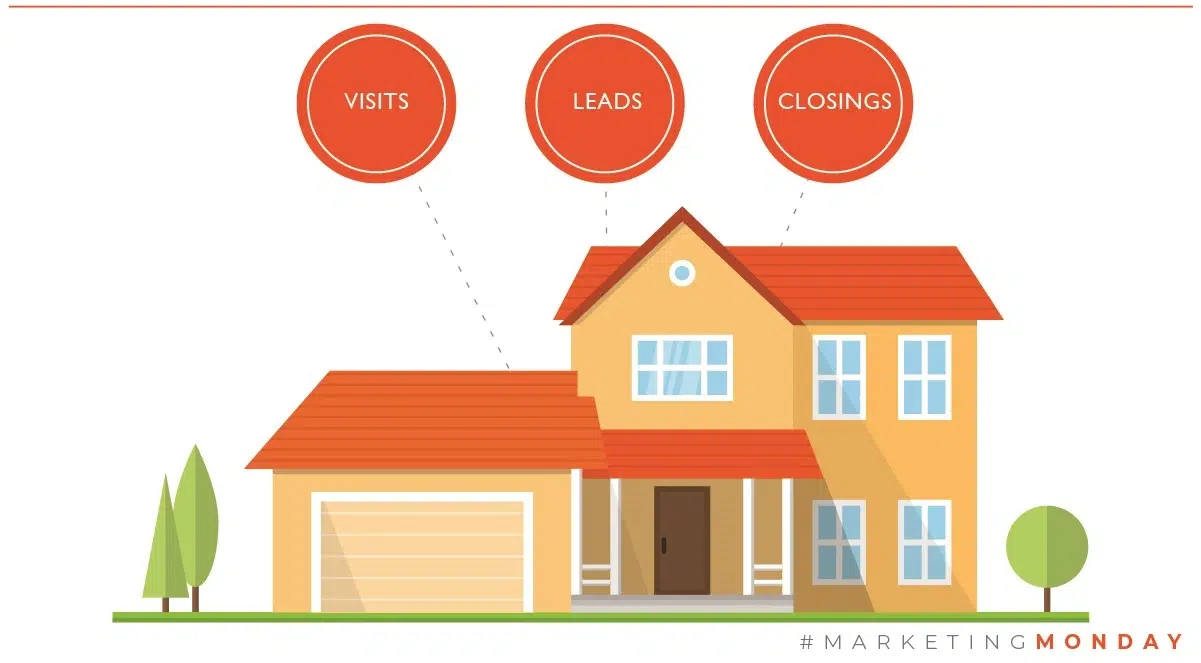
Social media has become an essential marketing tool for real estate agents. With millions of people using social media platforms like Facebook, Twitter, and Instagram, it’s no surprise that real estate professionals have jumped on the bandwagon to promote their listings, share their expertise, and build their brands.
However, many real estate agents ask how to measure the success of their social media marketing efforts. After all, social media is not just about the number of followers or likes; it’s about how these metrics translate into business outcomes, such as lead generation, sales, and brand recognition.
In this blog post, we’ll explore the different ways to measure the success of your social media marketing for real estate. We’ll cover the following topics:
I. Defining success for real estate social media marketing
II. Identifying and setting goals
III. Tools for measuring success

Before we dive into the different metrics that you can use to measure the success of your social media marketing, it’s essential to define what success means for real estate social media marketing.
Success in social media marketing can mean different things for different businesses. For real estate, success can mean:
· Generating leads: Social media can be a powerful lead-generation tool for real estate agents. Real estate agents can attract potential buyers and sellers to their social media pages by sharing property listings, market insights, and valuable content.
· Increasing engagement: Engaging with your audience is essential to social media marketing. Real estate agents can build stronger relationships with their audience and keep them engaged by responding to comments, sharing relevant content, and initiating conversations.
· Improving brand awareness: Social media is an excellent platform to promote your brand and increase visibility. By consistently sharing high-quality content, real estate agents can increase brand recognition and attract more followers.
· Boosting sales: Ultimately, the success of your social media marketing efforts should translate into business outcomes, such as increased sales. Real estate agents can drive more sales and revenue by leveraging social media to generate leads, nurture relationships, and showcase listings.
Once you have defined what success means for your real estate social media marketing, the next step is identifying and setting goals. Goals are essential for measuring the success of your social media marketing efforts, as they provide a clear benchmark for what you want to achieve.
When setting goals, it’s essential to follow the SMART framework, which stands for Specific, Measurable, Achievable, Relevant, and Time-bound.
· Specific: Your goals should focus on a particular outcome. For example, generating 50 leads per month from social media.
· Measurable: Your goals should be measurable so that you can track your progress and evaluate your success. For example, use Facebook Insights to track the number of leads generated from your social media campaigns.
· Achievable: Your goals should be achievable, taking into account your resources, budget, and capabilities. For example, setting a goal to generate 500 leads per month when you only have 100 followers is unrealistic.
· Relevant: Your goals should be relevant to your business objectives and align with your marketing strategy. For example, setting a goal to generate leads from a social media platform your target audience does not use is irrelevant.
· Time-bound: Your goals should be time-bound, with a specific deadline for achieving them.
For example, generating 50 leads per month from social media within the next six months.
By following the SMART framework, you can ensure that your goals are specific, measurable, achievable, relevant, and time-bound, making it easier to measure the success of your social media marketing efforts.
Now that you have defined success for your social media marketing and set SMART goals, the next step is to measure your progress towards achieving those goals. There are several tools available that can help you measure the success of your social media marketing efforts, including:
1. Social media analytics: Most social media platforms, such as Facebook, Instagram, and Twitter, offer built-in analytics tools that allow you to track your social media performance. These tools provide insights into metrics such as impressions, reach, engagement, and clicks, giving you a clear picture of your social media posts’ performance.
2. Google Analytics: In addition to social media analytics, you can also use Google Analytics to track traffic to your website from social media. By setting up tracking codes and goals in Google Analytics, you can measure how many visitors from social media are converting into leads or sales.
3. CRM software: Customer relationship management (CRM) software can also help track the success of your social media marketing efforts. By integrating your social media accounts with your CRM software, you can track leads and sales that originated from social media and measure the ROI of your social media campaigns.
4. Third-party analytics tools: There are also several third-party analytics tools available, such as Hootsuite, Sprout Social, and Buffer, that provide more in-depth analytics and reporting features than built-in social media analytics tools. These tools can help you track your social media performance across multiple platforms and provide insights into audience demographics, engagement, and sentiment.
By using these tools to track your social media performance, you can measure the success of your social media marketing efforts and adjust your strategy accordingly to achieve your SMART goals.
Measuring the success of your social media marketing efforts is essential for real estate agents who want to generate leads, increase engagement, improve brand awareness, and boost sales. By defining success for your social media marketing, setting SMART goals, and using analytics tools to measure your progress, you can optimize your social media strategy and achieve your business objectives.
Key metrics to measure success
Several key metrics should be paid attention to when measuring the success of your social media marketing for real estate. These metrics help you understand how well your social media efforts are performing and whether they are helping you achieve your business objectives.
Some key metrics to measure the success of your social media marketing for real estate include:
1. Reach refers to the number of people who have seen your social media content. It’s essential to track your reach to understand how many people are exposed to your brand and messages.
2. Engagement: Engagement refers to the number of likes, comments, shares, and other interactions your social media content receives. Measuring engagement can help you understand how well your content resonates with your audience.
3. Click-through rate (CTR): CTR refers to the percentage of people who click on a link in your social media content. Tracking CTR can help you understand how well your content drives traffic to your website.
4. Conversion rate: Conversion rate refers to the percentage of people who take a desired action, such as filling out a contact form or requesting more information, after clicking on a link in your social media content. Measuring conversion rates can help you understand how well your social media efforts generate leads and sales.
By tracking these metrics, you can get a clear picture of how your social media marketing for real estate is performing and make data-driven decisions to improve your strategy.
Benchmarking your performance
In addition to tracking your social media performance, it’s also important to benchmark your performance against industry standards and competitors. It can help you understand how well you are doing compared to others in your industry and identify areas where you can improve.
To benchmark your social media performance for real estate, you can use tools like Sprout Social’s social media index, which provides industry benchmarks for engagement rate, response time, and follower growth. You can also use tools like BuzzSumo to analyze your competitors’ social media performance and see what works for them.
By benchmarking your performance, you can identify areas where you are falling behind and adjust your strategy to stay competitive.
Adjusting your strategy
Measuring the success of your social media marketing for real estate isn’t just about tracking metrics and numbers. It’s also about using that data to make informed decisions and adjust your strategy accordingly.
For example, if your reach is low, you might need to adjust your targeting or posting schedule. If your engagement is high but your conversion rate is down, you might need to improve your website’s or landing page’s quality.
Using data to guide your decision-making, you can optimize your social media strategy and achieve your business objectives.

Measuring the success of your social media marketing for real estate is critical to achieving your business objectives. By tracking key metrics, benchmarking your performance, and adjusting your strategy based on data, you can improve your social media performance and generate more leads, increase engagement, and boost sales.
Remember to set SMART goals, use analytics tools to track your progress, and stay current with industry benchmarks and trends to stay competitive. With a data-driven approach to social media marketing for real estate, you can achieve your business goals and grow your business.
FAQs
Q: What metrics should I track to measure the success of my social media marketing for real estate?
A: Some essential metrics to track include reach, engagement, website traffic, lead generation, and conversions.
Q: How can I improve my social media marketing performance for real estate?
A: To improve your social media marketing performance, you can analyze your metrics, adjust your strategy accordingly, consistently post high-quality content, engage with your audience, and leverage paid to advertise.
Q: How often should I post on social media for my real estate business?
A: The frequency of your social media posts will depend on your audience and platform. Posting 2-3 times weekly is a good starting point for most real estate businesses.
Q: How can I ensure my social media marketing efforts align with my real estate business goals?
A: Start by defining your real estate business goals and identifying how social media marketing can help you achieve them. Then, tailor your social media strategy and content to align with these goals.